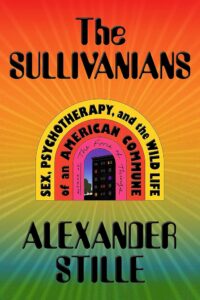Book Review: The Psycho-Brigadista
 The Sullivanians: Sex, Psychotherapy, and the Wild Life of an American Commune, by Alexander Stille. New York: Farrar, Straus and Giroux, 2023. 432 pp.
The Sullivanians: Sex, Psychotherapy, and the Wild Life of an American Commune, by Alexander Stille. New York: Farrar, Straus and Giroux, 2023. 432 pp.
In the first book written about the Abraham Lincoln battalion, Eddie Rolfe observed that the volunteers came “from every walk of life,” a phrase that has been repeated in almost every book about the Lincolns. And surely they did, though some social categories were unique or obscure.
Many medical workers volunteered but I believe William Pike was the only licensed psychoanalyst who joined the Lincolns and showed special skills in calming soldiers terrified by the conditions of warfare. He was not, however, the only Lincoln vet who would pursue a career in psychoanalysis. His upstart “colleague” who was born Saul Cohen and renamed Saul Newton, remained barely educated in the field and was never licensed to practice. Yet he would command a cult of therapists known as Sullivanians. (Their original model was a legitimate psychoanalyst Harry Stack Sullivan.)
This amazing story, told in 400-plus pages by Alexander Stille, follows the life of Newton from his service in Spain (wounded at Fuentes de Ebro in 1937) to the launching of the Sullivan Institute for Research in Psychanalysis which operated on the Upper West Side of Manhattan from 1957 to 1991. Its goal was to liberate a young generation from the traditional nuclear family by demanding that it radically break parental connections with their own kin and even their own children at an early age.
Newton’s biography (1906-1991) seems to follow closely the pattern of Jewish immigrants who fled Russia in the early twentieth century, attended public schools, and, in his case, wound up at the University of Chicago’s school of social work. His second of six wives was Constance Kyle, who had also been in Spain working with Spanish children in refugee camps. The outbreak of war in 1941 interrupted their studies and Ms. Kyle disappears from the story.
After the war, Newton found work with an offshoot of the Freudian movement that focused on “interpersonal psychotherapy” and stressed the social advantages of multiple relations rather than obsessing on one’s id or superego. Newton became passionate about this subject as well as the woman who would become wife number four, Jane Pearce. She had acquired her due credentials in medicine and psychoanalysis plus some inherited wealth.
Together they founded the Sullivan Institute and attracted other therapists who worked under their authority as well as student therapists and patients, developing a structure of joint living accommodations, therapeutic sessions, sexual liberation, and cultural discussion. By the 1960s and 1970s, communes had spread around the country, critical of capitalism, war, violence, marriage norms and traditional family life.
The book is loaded with case studies as eager clients pursued therapists and therapists hungered for approval from the leading man and woman: Newton and Pearce. Many of the situations appear to this reader as plain extortion. To succeed, patients and therapists alike had to grovel before the ridiculous demands of the leaders. Sometimes it meant “taxing” for extras; sometimes it was apartment allocations. Most grievous was the destruction of relationships within parent-child units. Kids were forced to leave their parents; parents were forced to abandon their kids. Women were instructed when and with whom they could be impregnated, often required to have multiple sperm donors so no one knew exactly who was whose father.
And who made all these decisions, large and small? Newton and Pearce.
Nor was their therapeutic hand light. They screamed at their patients, yelled at little children, insulted everyone. They raped their clients during therapy.
To avoid becoming victims of such behavior, residents anticipated how they could entrap someone besides themselves. Spying and snitching kept people off-balance, fearful of being expelled from the Group and losing all they had worked for.
Newton became famous for his rages, but he was not alone in that leadership group. Some compared him to Hitler; the leadership’s housing, far more luxurious than the ordinary group apartments, was called the Kremlin.
Finally, Newton began losing his mind, falling asleep in his office, demanding sex from women (who continued to oblige him, though it took hours to complete intercourse as he entered his seventies and eighties). But not until 1991 did death break up his paradise.
Peter Carroll is the author of The Other Samuel Johnson: A Psychohistory of Early New England.












